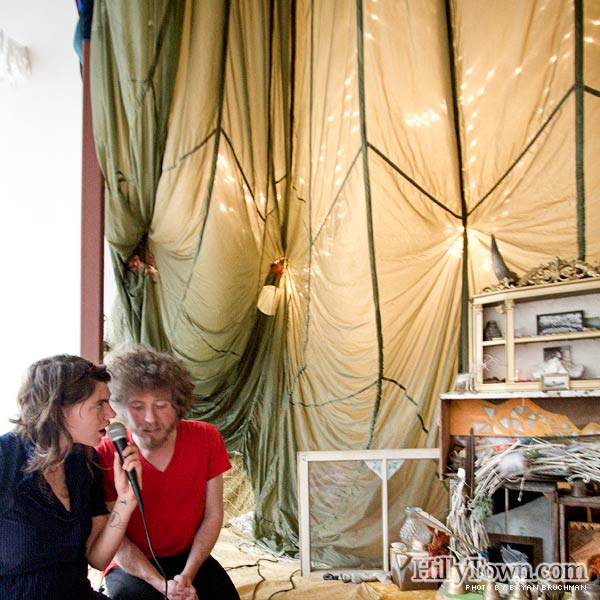
Interview by Matt Dodge. Whispering Altar photos by Bryan Bruchman.
A spectacle at the center of Portland’s folk/pysch/drone scene for the last three years, Planets Around the Sun will take their leave of the city in the coming weeks.

Having shed most of their possessions in preparation for the trip, Ian Paige and Caitlin King will set off across America in a highly inconspicuous silver van with plans to play a range of traditional and non-traditional venues including farms, communes, lakes and canyons.
Living with folk contemporaries Matt Lajoie [Herbcraft, Cursillistas], Nick Barker and Corinna Marshall [Tempera], Planets Around the Sun have enjoying a critical mass of creative tension, churning out a number of releases on Lajoie’s L’Animaux Tryst Field Recordings label.
The duo also play as part of the live Herbcraft band, which will take the stage Sunday afternoon at Portland’s Deep Heaven Now psych festival (which starts tonight at SPACE Gallery) as the group celebrates the release of the newest Herbcraft record, Ashram to the Stars on Woodsist-affiliated label Hello Sunshine.
On Thursday, Planets Around the Sun debuted THE WHISPERING ALTAR,the band’s first gallery installation composed of an “immersive and interactive sound and visual world.†Funded by a Good Idea Grant from the Maine Arts Commission, the installation runs through tonight at Whitney Art Works (492 Congress St).
I sat down with Planets Around the Sun outside of Whitney for an exit interview and quite possibly the last known interview with the band before they ascend to a higher astral plane.

Hillytown: Can you tell us a little more about the idea behind Whispering Alter?
Ian Paige: Sonically, it’s a drone piece that has a “taking it to church†kind of feeling. We tried to come up with sounds that helped moved the person experiencing it into a more meditative state of mind. Then we’ve got three microphones set to different delays running through a lot of effects processing so that you can either just meditate at the alter by yourself or you can contribute to it. At the opening it was really cool to see people playing music with eachother; singing, harmonizing. I’ve been describing it as a “sonic wishing well†— it’s that feeling of realizing when you are saying prayers or making wishes, to have your voice comes back suggests that it might fall on you to make whatever you’re wishing for happen.
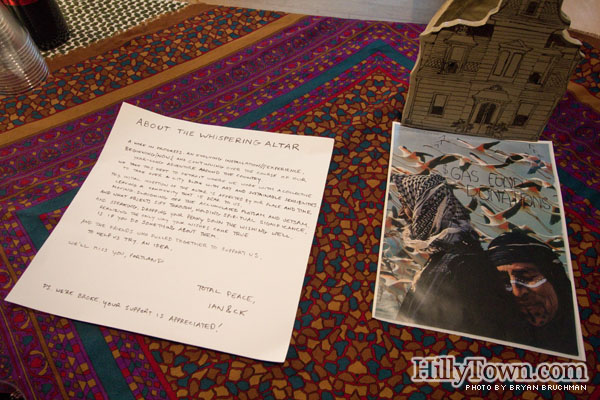
It came out of a desire to not just be a band in the sense of playing shows. We’ve always tried to do more than that with creating happenings and making our concerts events with solstice and equinox celebrations. We’re about to go on tour and we really wanted to be able to not just tour in a concert fashion but be able to have some sort of sound installation to take on the road. This was a way to start working out the kinks. What made this cool is that it [was] a lot of our friends coming together and helping with different objects.
CK: I think The Whispering Alter is really nice because it’s a nondenominational meditative environment so that, you know, wherever you plant it, it theoretically is a chance to peace out for a little while. If this show was going much longer, if we weren’t leaving, I can just imagine that it would be really nice for people just on their coffee break to stop in for a second [and] feel like they have the power to express themselves and to take some time out of their day.
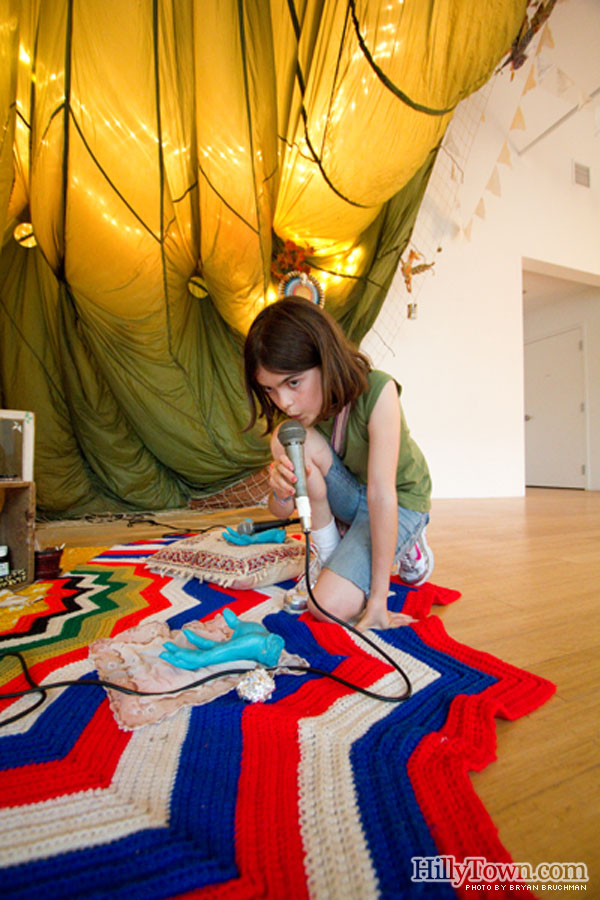
Hillytown: Are there plans to take the installation on the road with you?
IP: We want to have this as an option. We are definitely going to do this in Detroit — we’re going to spend the month of August in Detroit and work with an artist collective there — but we’re not going to be able to take everything with us. We’re sloughing off our possessions and sort of filtering through which objects hold spiritual resonance, so this is a way to take the clutter of our lives and distill it down into certain objects that have meanings for us. It’s an excuse to bring a cool thing, keep it incorporated into our lives, but in a more intentional way.
CK: I think we spend a lot of time these days pouring energy into objects and acquiring objects and the ones that have the strongest energies and sentimental value — on some level it’s just the energy that you ascribe to it — so then the arranging of things is a way to kind of pay homage to the things we have held onto and now are going to let them go.
How did Planets get started?
Caitlin King: Planets started as a band that was Matt Lajoie, Ian and myself where we just started making sort of improvisational space rock with our only lyrics being “planets around the sunâ€. We originally formulated that we would only play on solstices and equinoxes — or that we would at least play at every solstice and equinoxes.
IP: We ended up wanting to play a lot more.
CK: The solstice and equinox shows sort of became more events because they felt communal, there was more of a purpose that everybody could get behind. It was kind of us a way to play alternative spaces. We played the summer solstice on a boat last year, we played in yurts and planetariums and all these different kinds of places to try to bring more of an artistic element to music. [The Whispering Alter] is sort of the inverse of that — trying to bring music to art.

Hillytown: Why did you decide to skip town for a while? Is there some growth that needs to happen that you didn’t think could occur in Portland?
CK: I think Portland is the most amazing place I’ve ever been because it allows you to expand and grow. Whether people are completely into what you are doing or not, there is so much support for local art and local musicians and just people doing what they want to do because on some level people in Maine are starved for the next thing. It’s not like in New York City where you are constantly surrounded by distractions and things already happenings that it’s so hard to get stuff done. I think Maine has been really good to push us to get us to the point where now it feels like it would be a crime not to take that other places. And we’ve never been across the country, so it’s kind of time to do it.
IP: That untethering is definitely a spiritual exercise. To be able to focus on music and the adventure solely is going to be life-changing, I can tell already.
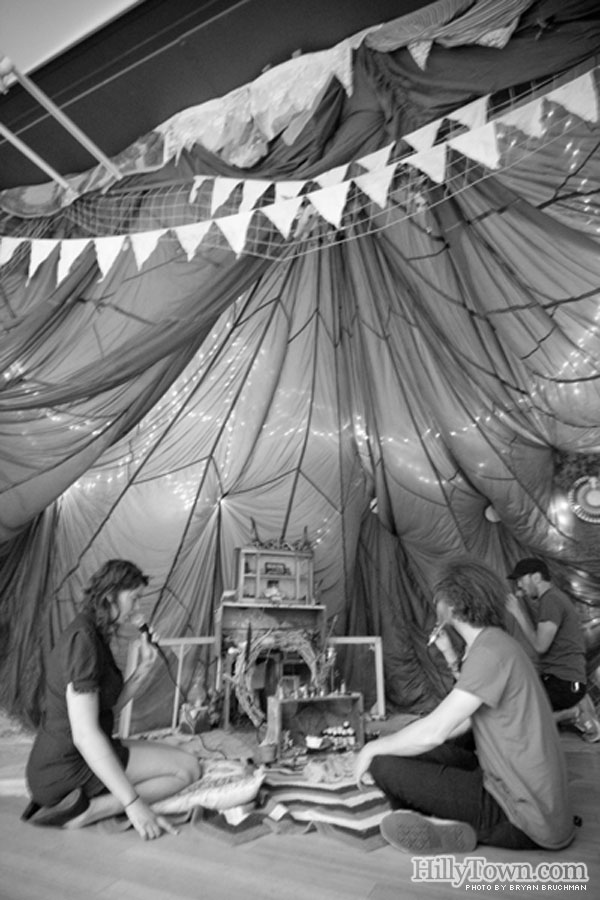
Hillytown: There is a strongest aesthetic to both your music and the art/installations that tend to accompany it. Have either of you studied art? Do you think it informed the band?
CK: I’ve always done visual art on some level, but art has always been something I haven’t wanted to study and haven’t wanted to touch. I think it’s just a hobby for the most part. When you want your life to be art, it just kind of happens all over the place, you know?
IP: I studied film and art history in college, so I’m trained as a filmmaker but I don’t really use that. I think it’s effected the way I think about sound and how I approach editing recorded material. But visually, it’s similar story as Caitlin, I was a kid who drew and I’ve always been really into performance and that’s where the music aspect of things comes from.
Hillytown: Are there any specific influences from film that one might see played out in your work?
IP: i think spiritually, two major guiding lights would be [Jean-Luc] Godard and [Alejandro] Jodorowsky. Godard for his way of upsetting the medium and trying to distill it into a truer form and Jodorowsky because he’s a wizard
CK: Yeah, he’s a vibe creator.
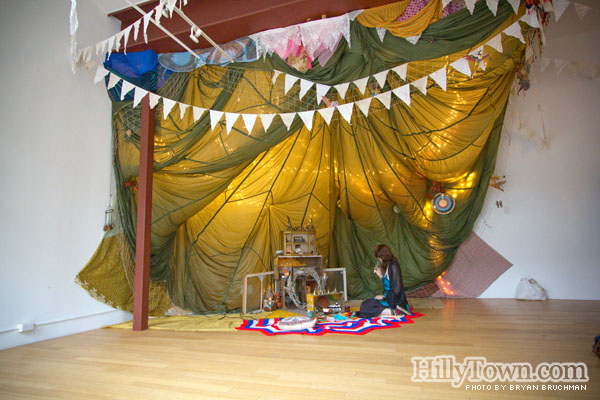
Hillytown: What is the current state of Portland’s folk-psych-drone scene? Do you think your departure will create a noticeable absence?
Ck: I think it’s going to have no problem continuing. We’re not the only people who are interested in doing this. I think there is always a group or a house or a collective of people that have more presence in the time they’re in. First there’s the Big Blood guys and Cerberus Shoal, then there’s Visitations and the Time-Lag [Records] community — they might be a little more chillin’ out these days, a little less active at least in Portland — but I think that just because we’re leaving it’s not going to stop. I think us leaving on some level makes room for new voices to come in; Jakob Battick, I think he has some influences that are similar to us; Theodore Treehouse is awesome and there’s a bunch of kids now who are …
[Ten minute interlude here as Caitlin and Ian indulge the stream of consciousness ramblings of a man walking by the gallery. Highlights include ruminations on the man’s collection of coffee mugs and possible names for the child he hopes to father with Caitlin.]
IP: I wanted to finish saying that the scene continues because Matt [Lajoie] is still here and him being able to be a catalyzing center of gravity for all of this through the [LTFR] label, that stays here in Portland and I think that is huge. And we’re all playing in Herbcraft along with our housemates Nick and Corinna [of Tempera] and that band is going to continue is our absence, hopefully we can find them again in our travels.
Hillytown: How has living with this critical mass of like-minded individuals helped you to progress in your own work?
IP: We’ve been lucky to have all congregated, and definitely when we all started living together there was exponential growth and we were able to do so much more. But it’s not just making music, it’s listening to records together and just generally learning more.
CK: I think living together has helped us not so much to put out more stuff or play more shows, but we’re all so much more connected. We see each other almost every day. sometimes we drink beers on the front porch, sometimes we just shut ourselves in our rooms. I think just being around people who you want to make music with, often your energy levels can kind of combine and I think that’s why recently we’ve been able to play better — we’re around more, we’re one family.
IP: Not speaking of genre, I’m going to use the word “folkâ€, but I don’t mean psych-folk. The kind of music we’re making is update folk in that it’s coming from an outsider art perspective, it’s not about being trained, it’s about making music that you want to make and making it with others or by yourself.
Hillytown: Ian, you’ve played in more straightforward indie rock bands here in town [The Enchantments, Certain Numbers], when did you really start to veer off into the esoteric?
IP: I had always had it because of what I listen to. In college I spent a lot of time making pretty abstract electronic music and then shyed away from that to get out from the computer. I didn’t really know how to play guitar and I was like ‘I’m not going to learn trying to make music on a computer’. I think I started more straightforward because it’s what made sense to me at the time and to tap into other references I had musically. I think i just figured out I could combine my love of ambient and far-out stuff with some pop sensibilities.
Hillytown: What’s it like to make music on a small label and share a house with the person who runs it? What is your own involvement in LTFR?
IP: We are definitely playing a supportive role in the way we are all filtering eachother’s interests, but it’s all [Lajoie].
CK: Putting out music is sort of like getting a tattoo — it’s great to go to someone who really knows what they’re doing but it kind of means more if it’s coming from a friend. If a friend gives you a tattoo it means something special and again there is that energy transference. It’s been really awesome to put that stuff out on Matt’s label and know there’s space for that. I think the smaller label really helps because if we create something at the very least we know we can put it on L’animaux and that’s a really supportive thing to do.
Our first cassette tape, Gold, we were able to put that out on Digitalis, but it’s more about the creation of the music I think and having these artifacts and just living your life being able to play music and to let people hear it and be a part of it instead of try to get a fancy sportscar or whatever you do when you try to make money with music.
Hillytown: Are there any places you hope to see/play during your travels?
IP: There are a couple different things going on on the tour. We do sort of more traditional venues through New England. But then down in Virginia we are playing a tofu commune, a tea house. Then we move our way up to Detroit, we are spending a month there. Part of what I’m excited about the tour is to not have the typical load-in, load-out and you don’t get to really have any meaningful interactions with people. I want to spend time where we are going; it’s a lot of why Caitlin’s been working on booking a farm tour which is going to get us through the Midwest.
CK: It’s really just us trying to live life the way we want to live it and to go for it. We want to travel, we want to see places and talk to people and see how other communities are built. I’ve always had sort of an obsession With farm culture and more communal sort of environments so I think it’s just really interesting to see how people are living. The great part about the farm aspect is that we are going to be able to meet everyone and work with them and provide free labor for a whole day in turn for a really big meal and then we’ll play a show and the next day we can say goodbye. It allows for more human interactions when you are sitting with people at a campfire day rather than getting beer spilt on you at a bar.
IP: That’s the folk element again where we might be making amplified music or more far-out music than you would think of for a folk band, but the point is to meet “folk†and make connections and learn how other people live.
CK: I’m really personally excited about trying to play in Pyramid Lake in Nevada — it’s a lake out in a remote part of northwest Nevada and there something called the tufa pyramid which is this natural pyramid that’s in the middle of this lake. I’m excited about playing there and putting up the recording for free for people to listen to. I also really want to play in the Grand Canyon, Avenue of the Giants. Music belongs everywhere and I think that’s pretty much the idea behind this whole trip.
Hillytown: What are your plans for the month you’re spending in Detroit?
CK: We can’t say too much about it because on some level it’s probably illegal, But I think Detroit is really amazing now because it feels like the wild west where so much of Detroit has been abandoned that there’s more freedom to be able to live differently. I think it’s a place where people arw moving to because they can get these giant houses and build amazing things and people don’t have to fight for space there so literally feels like you are walking into a sort of dilapidated gallery space only it’s a whole city.
IP: And it’s so American. The media might color it as sort of like, hipster artists gravitating towards this place because they can buy a house, but more than anything I think it’s that freedom to redefine what existence is and I think there are so many brains in Detroit trying to define what a city can be because it can’t go any lower. It’s the time to rebuild it and that’s a very American idea, like, let’s forge our own communities and buck the expectations. I think just upsetting the normative waysw e are putting ourselves together as a contemporary American society and it’s a rare moment where there are these places.
CK: I do think it’s this example of commerce failing and people having to sort of go back to the basics and find a way to feed themselves and find a way to still survive and the fact that that happens in an urban setting is really interesting. There are so many urban farms popping up there … I don’t know if it’s a foreshadow of the future.
IP: But it’s an interesting present.
CK: Exactly. It really is the human mind trying to figure out how to revert back to things we use to know. That’s a big interest of mine — trying to figure out how to learn those things. The best thign about urban farming is that you don’t feel like you are retreating off and giving up, you’re not just dropping out of society, you’re changing it and changing what you think a community and a city can be.
Hillytown: Is Planets primarily a band? Is it also visual project or a community building exercise?
CK: Planets Around the Sun started in my brain as a concept on sound and music and the idea of song being essentially worlds, this idea that going from one world into the next and communicating the sounds in between the worlds as well. It was also a book that wanted to be written and I think it definitely does have a particular face to it visually.
IP: As soon as [Caitlin] shared that concept, the concept itself became what Planets is about. It tends to focus on music as a way to create connection, but I think it’s a lot about us and what we’re orbiting around, the people that we find that fall in line with that gravity.That pool will grow as we travel, at least I hope it does.
CK: The music started as improvisations. Very early on at our first couple shows Ian would always pass out instruments to people and I think it is a sound that people feel they can participate in. I remember at Sacred and Profane there was a guy banging antler above his head, and people were coming in trying to steal our mics. That happens quite often because it is a communal sound it’s open to everybody on some level. Planets essentially is kind of this concept of how each person is on some level their own solar system and their own planet and that we can all revolve around the same idea or moment or sound in time.
IP: It’s more of a lifestyle, Planets Around the Sun could become a farm.
CK: It probably will be. I definitely had a dream early on for Planets that we would have a big commune and everyone’s house would be planets and the sun would be the central house where everyone could come commune.
IP: Right now it absolutely is an expression of Caitlin’s and my creativity. We are writing songs, it’s still a band, but it’s nice to not have to feel defined by that; it can cross whatever genre it needs to.
Hillytown: Is there anyone you hope to meet or play with on your travels?
IP: We are playing right away on our tour at the Whitehaus in Jamaica Plain [Boston]. That’s another example of a collective music making experience that is so good, they’re totally kindred spirits in that way. We are playing with Sunburned Hand of the Man, which is another very amorphous group. It’s cool to see that they’ve been around for that long, it’s another guiding light in that way.
HIllytown: Any favorite shows of memories of your time in Portland?
IP: I would say a really big one that sort of broke open the whole the ability to not have a typical formula was Matt and I had started this project Bad Bus with Crank Sturgeon, it was a proto-Planets kind of thing, really improvised noise, anything goes and we played at Space for, what was it?
CK: It was the 7/24 birthday in 2008 because Matt Lajoie, Brendan Evans from Strange Maine and I all have the same birthday. It was wild.
IP: We were all playing in all different corners of the room. You’ve got id m theft able with a tuba, counting on stage. We’re playing tape loop and it’s just complete frenzy. I know it was formative for Caitlin. I mean, Caitlin completely lost her mind in the best possible way.
CK: Yeah, I was screaming my head off for the most part and then I kind of fell down on stage in exhaustion next to Chriss Sutherland who was on the drums and Ian comes over with two drumsticks and starts to pretend to play me like a drum and I start to fight him for one. After fighting him and winning I was laying on the ground and looked over my shoulder I started banging the bass drum, probably freaking Chriss Sutherland out a good amount. I did that for a period of moments and then got up on stage and leapfrogged over Ian off the stage as he was bending down to play pedals. It was wild.
IP: That’s when it all started.
CK: I never thought that I would play music. I remember when I met Ian and started talking to him about what I was into and what I thought about music being a communication of sound, he was very adamant that I should play music and he gave me a large bucket to try to use as a drum, which i could never master, but once we got a real drum I could do it.
I think that’s a big part of why Planets is many, many things because I’m not at all a trained musician — I won’t even allow myself to know what string is what on the guitar — but I think that just having that kind of opportunity and realizing that anyone can make music and that anyone can find people who they sound good with. Without moving here I don’t think I would even be playing music now.
Leave a Reply